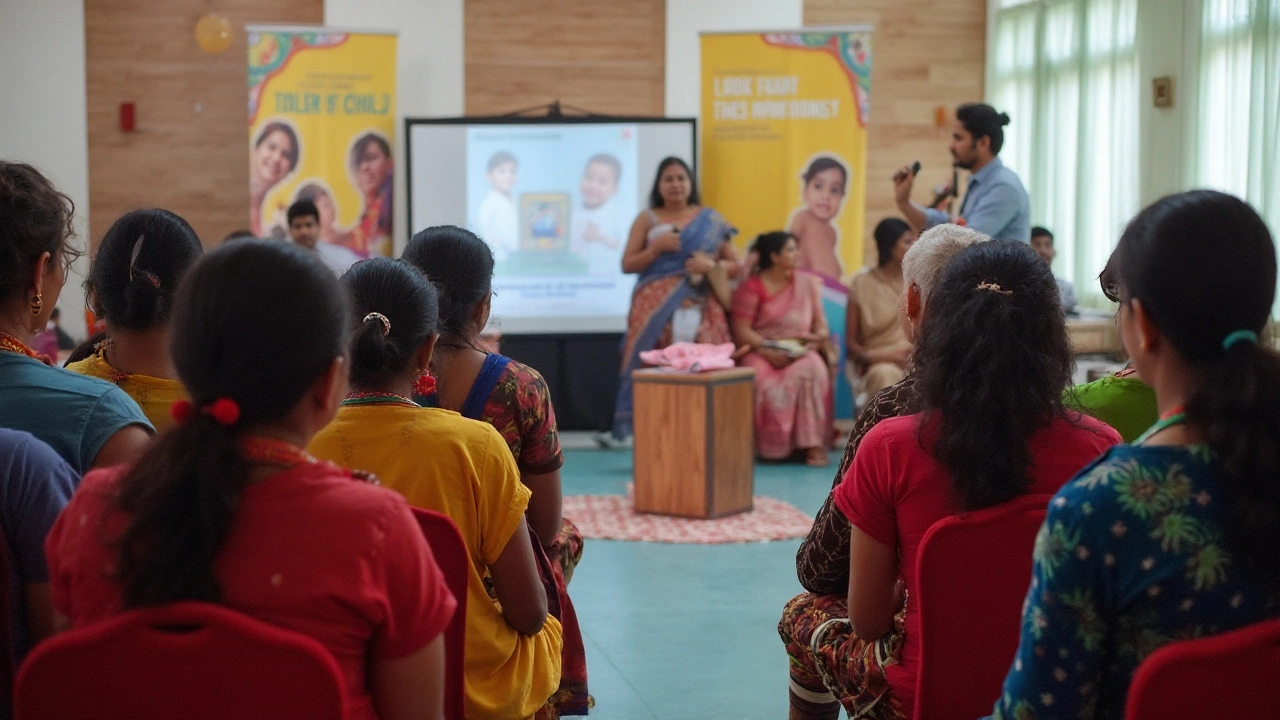In recent years, the number of children born via In Vitro Fertilization (IVF) has steadily risen, offering parents an opportunity where natural conception may be difficult. Despite its growing popularity, questions about the long-term health effects on these IVF children continue to linger. Parents naturally worry about whether their decision could inadvertently place their offspring at risk for health problems later in life.
With progress in reproductive technology, understanding IVF's potential implications becomes vital. By delving into scientific studies and data, we aim to provide a clearer picture of the health caveats surrounding IVF births. While scientific discoveries continue to illuminate these aspects, the relevance of ongoing health monitoring and medical advancements remains obvious to mitigate any risks associated with IVF.
- Understanding IVF and Its Global Popularity
- Potential Health Concerns
- Recent Scientific Findings
- Advancements and Final Thoughts
Understanding IVF and Its Global Popularity
In Vitro Fertilization, commonly known as IVF, has revolutionized the landscape of reproductive health, providing a lifeline to millions of couples worldwide who face fertility challenges. This process involves combining an egg and sperm outside the body, and once fertilization occurs, the embryo is transferred back into the uterus. This groundbreaking procedure was first successfully implemented in 1978, resulting in the birth of Louise Brown, the world's first 'test-tube baby'. Since that pivotal moment, IVF has gradually become a cornerstone of fertility treatments, playing a crucial role in helping families grow.
The rise in the popularity of IVF treatment can be attributed to several factors. One of the most significant is the increasing prevalence of fertility issues. Studies show that nearly one in seven couples globally encounters some form of infertility, a statistic that has contributed to the continuous demand for reproductive technologies. The increasing average age of first-time parents, often due to career considerations, has also played a key role in this trend. With the ticking of the biological clock, IVF offers an alternative to those who wish to conceive later in life.
According to Dr. Sarah Franklin, a leading fertility expert, "IVF has not only unlocked the potential for many to experience parenthood, but it has also opened up dialogues about fertility that were previously unspoken."
As of 2023, more than eight million children have been born through IVF worldwide, highlighting its acceptance and success. The procedure is not without its costs, both emotional and financial, yet its success rate and the joy it brings to families are often seen as invaluable. Different countries have varying regulations and financial support structures concerning IVF, with nations like Denmark and Israel offering substantial public funding support. These differences play a role in accessibility and popularity across the globe. As a consequence, IVF clinics and specialists have expanded their services to meet the growing demand, now being available in nearly every corner of the world.
The rapid growth of IVF is also fueled by advancements in related technologies and better patient outcomes. Techniques such as Preimplantation Genetic Testing (PGT) have made it possible to screen embryos for genetic disorders, increasing the chances of successful implantation and healthy offspring. With each passing year, the science behind IVF becomes more refined, resulting in gradual increases in success rates and more tailored approaches to individual needs. This continuous evolution keeps IVF at the forefront of reproductive medicine and makes it a pivotal option for countless hopeful parents.
While the journey through IVF can be arduous, with its fair share of emotional ups and downs, the advancement, availability, and increasing success rates offer hope and the possibility of fulfilling dreams of parenthood. As reproductive technology continues its march forward, IVF remains a beacon of possibility for those striving against the challenges of infertility, omnipresent in the global narrative of family-building.

Potential Health Concerns
When a child is born through IVF treatment, there are often questions regarding potential health risks they might face later in life. Most of these concerns stem from the very nature of how IVF manipulates the conception process. Though IVF is generally considered safe, it is important to scrutinize the risks. Some studies have suggested that there might be a slightly higher incidence of preterm birth and low birth weight in IVF children. These infants sometimes require special medical attention in the early days, which may catch parents off guard if they are not prepared for such scenarios.
Multiple pregnancies, which are more common with IVF, can increase the risk of complications not just for the children but also for the mother. These complications include gestational diabetes, preeclampsia, and an increased likelihood of cesarean delivery. Moreover, science has been probing the potential links between IVF and certain congenital anomalies. Although most IVF children do not exhibit birth defects, there is a tendency for slightly higher incidences of certain issues compared to their naturally conceived peers.
Recent research has also raised concerns about possible long-term metabolic and cardiovascular risks. Although these insights are still nascent and require more extensive study, they should not be dismissed lightly. For example, a few studies observe that IVF children have different lipid profiles compared to others. However, it's essential to keep in mind that these are early observations and need further validation. As Dr. Laura Mason from the World Health Organization once noted,
"IVF remains a major marvel of modern medicine, but like any intervention, understanding its full impact is vital for future generations."
The psychological aspects also merit attention. There is some debate over the potential for developmental differences, with ongoing studies aimed at understanding childhood psychological outcomes. Though most IVF children thrive just like any other, some researchers call for more nuanced analyses to verify if there are subtle differences in emotional and cognitive development. By looking at controlled cohort studies, scientists aim to unravel these intricacies, ensuring that parents and clinicians can make well-informed decisions.
| Potential Health Concern | Incidence Rate (IVF vs Natural) |
|---|---|
| Preterm Birth | 14% vs 9% |
| Low Birth Weight | 13% vs 8% |
| Congenital Anomalies | 3-4% vs 2-3% |
Nonetheless, parents considering or having undergone IVF should be reassured. Most IVF children grow up healthy and lead normal lives. The studies often yield mixed results, highlighting the importance of individualized healthcare approaches. Potential risks must be balanced with the amazing success stories and the joy of parenthood IVF has brought to countless families. Armed with knowledge, parents can take proactive steps, like planning for additional prenatal visits and considering genetic testing to counteract these minor risks.

Recent Scientific Findings
In the quest to understand the health consequences for IVF children, numerous studies have been conducted worldwide. One prolific study involved analyzing data from over 500,000 children, finding that while most IVF children grow up to be healthy adults, there exists a slightly increased risk for certain conditions. Researchers have noted, for instance, that there is a small yet statistically significant uptick in the likelihood of congenital heart defects. However, it's essential to remember that these risks remain relatively low compared to the probability of a healthy outcome.
The conversation around these findings often extends into areas of ongoing research — areas where figures and statistics tell part of the story. Developmental milestones and cognitive achievements, interestingly, appear largely unaffected in the majority of IVF-conceived individuals. Recent studies are reassuring, showing that while small deviations can occur, particularly in preterm birth instances, these usually do not translate into long-term developmental delays. Researchers continue to emphasize the value of comparing such data with naturally conceived cohorts, providing context and clarity for these findings.
"It is fair to say that while some risks are present, the success of IVF in bringing healthy babies to term has greatly eclipsed the occasional anomalies observed," – Dr. Fiona Stanley, Researcher from Murdoch Children's Research Institute.
Intriguingly, the latest data points to a stabilization in metabolic features during childhood, suggesting that IVF births do not significantly impact metabolic function over time. Advances in embryo culture media and freezing techniques have arguably enhanced both immediate and long-term outcomes. A promising new avenue of study involves epigenetic profiling, attempting to see if and how early cell handling during IVF might influence genetic expression. Here, we see emerging patterns and hope that these scientific efforts can offer deeper insights into any subtle shifts in health patterns amongst IVF children.
For those keen on the numbers, a wide-scale analysis segmented by regional IVF practices revealed interesting differences. IVF treatment success and subsequent child health correlate with specific protocols adhered to by clinics around the globe. Data suggests variations exist due to factors such as embryo selection methodologies and hormone therapies employed. To present a clearer view, a table showing the differences in health risks based on regional practices might throw light on best practices:
| Region | Associated Health Risk | Success Rate |
|---|---|---|
| North America | Marginal increase in preterm births | 45% |
| Europe | Minor uptick in respiratory issues | 48% |
| Australia | No significant deviation from normal | 50% |
All in all, the array of current scientific findings highlights not despair, but places a spotlight on the admirable progress in IVF. It encourages a balanced view, one that combines optimism with a realistic understanding of medical challenges, aspiring to empower parents with knowledge, while remaining hopeful about ever-improving healthcare solutions.

Advancements and Final Thoughts
Over the past decade, IVF treatment has witnessed significant advancements, making it more effective and safer for both parents and children. Innovations like preimplantation genetic testing (PGT) are allowing parents to screen embryos for genetic disorders before implantation, potentially reducing health risks in children. The use of cryopreservation techniques to freeze eggs and embryos provides flexibility and increases the chances of a successful pregnancy. These improvements are gradually easing the worries that prospective parents face, especially when it comes to the possible long-term impacts on IVF children.
Despite these technological leaps, concerns remain, urging experts to continue rigorous research. According to a study published in the journal Fertility and Sterility, ongoing evaluation is crucial to ensure any potential risks are monitored and managed. Parents should engage in open dialogue with healthcare providers to stay informed about recent developments. This collaborative approach empowers them with knowledge to make decisions that align with their familial goals and expectations.
It's also essential to consider the psychosocial aspect of IVF children. As society becomes more accepting of varied conception methods, the stigma and misconceptions are slowly diminishing. Educational resources and community support are bolstering parents' confidence, resulting in positive psychosocial outcomes for children born through IVF. Dr. Maria Johnson from the University of Sydney highlighted in her recent study that 'education and acceptance play pivotal roles in shaping the health and well-being of IVF children'.
Looking ahead, the integration of artificial intelligence in IVF treatment may further streamline processes by individualizing treatment based on unprecedented amounts of data. Efforts to make treatments affordable and accessible globally are also underway, as evident from collaborations between fertility clinics and research institutions worldwide. The hope is that with persistence, IVF can become not only a viable but also a commonplace option for expanding families.
Ultimately, while unknowns still hover over the future trajectories of IVF children, advancements provide reassurance. As scientific frontiers expand, the dream of having a family becomes a reality for more individuals every day. In embracing technology and education, parents can confidently stride forward, knowing they are part of a broader movement that celebrates life in all its conceived forms.
